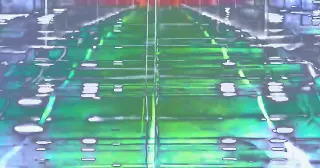ACADEMIA
Japanese researchers focus on complex waves
 Extreme nonlinear wave group dynamics in directional wave states
Extreme nonlinear wave group dynamics in directional wave states
Understanding the unpredictable behaviors of ocean waves can be a matter of survival for seafarers. Deep-water wave groups have been known to be unstable and become rogue, causing unsuspecting boats to tip over.
This rogue wave behavior results from modulation instability, which generally occurs only for uni-directional waves. Wave focusing -- the amplification of waves -- is also expected to weaken when interacting with other wave systems.
Now, a team led by Kyoto University has demonstrated that such unstable wave groups propagate independently regardless of interference.
"Our results seem to support the concept of an unperturbed nonlinear water wave group focusing in the presence of counter-propagating waves, implying that the wave states are directional," says lead author Amin Chabchoub.
Using a water wave tank, the team performed experiments validating results from supercomputer simulations based on the coupled nonlinear Schrödinger equation. This nonlinear wave equation model accounts for complex interactions of waves propagating from two different directions.
The team's findings demonstrate that the model agrees well with the experiments, including rogue and counter-propagating wave dynamics.
Fields such as offshore engineering, nonlinear optics, electrical engineering, and plasma physics, as well as the study of extreme ocean waves, stand to benefit from a better understanding of the role of nonlinearity.
"Our study may further motivate theoretical and experimental studies to improve our understanding of such dynamics in the cacophony of different wave systems," Chabchoub concludes.
